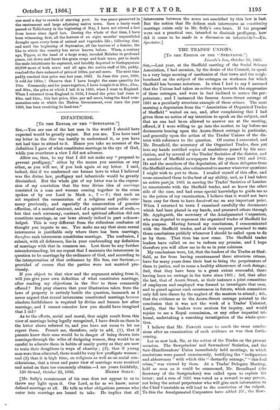INFANTICIDE.
[To THE EDITOR OF THE "SPECTATOR."] SIR,—You are one of the last men in the world I should have expected would be greatly unjust. But you are. You have read
my letter in the Star too hastily to understand it, or you have not had time to attend to it. Hence you take no account of the definition I gave of what constitutes marriage in the eye of God, while you overthrow a view I did not advance.
Allow me, then, to say that I did not make any " proposal to prevent profligacy," either by the means you mention or any other, as you will see, if you look again at my letter. I said, indeed, that if we conformed our human laws to what I believed was the divine law, profligacy and infanticide would be greatly diminished. But the whole gist of my letter was in the expres-
sion of my conviction that the true divine idea of marriage consisted in a man and woman coming together in the sense
spoken of by our Lord in Mark x., 7 — 9 ; that such an act required the consecration of a religious and public cere- mony previously, and especially the consecration of genuine
affection, of a mutual contract, and of a spiritual union of souls,—
but that such ceremony, contract, and spiritual affection did not constitute marriage, as our laws already indeed in part acknow- ledged. This is very different from the ridiculous confusion of thought you impute to me. You make me say that since sexual intercourse is justifiable only where there has been marriage,
therefore such intercourse constitutes marriage. The confusion, I
submit, with all deference, lies in your confounding my definition of marriage with that in common use. Lest there be any further misunderstanding, let me repeat that I maintain the intercourse in question to be marriage by the ordinance of God, and according to the interpretation of that ordinance by His Son, our Saviour,— provided of course that the parties were not married pre- viously.
If you object to that view and the argument arising from it, will you give your own definition of what constitutes marriage,
after reading my objections in the Star to those commonly
offered ? But pray observe that your illustration taken from the laws of property is entirely beside the question, inasmuch as I
never argued that sexual intercourse constituted marriage because absolute faithfulness is required by divine and human law after marriage, and I cannot conceive how you should have imagined that I did ?
As to the effects, social and moral, that might result from this view of marriage being legally recognized, I have dwelt on them in the letter above referred to, and you have not room to let me repeat them. Permit me, therefore, only to add, (1), that if parents knew their sons would be in danger of being drawn into marriage through the wiles of designing women, they would be as careful to educate them in habits of manly purity as they are now to train their daughters in ways of chastity ; (2), that if young menwere thus educated, there would be very few profligate women ; and (3) that it is high time, on religious as well as on social con- siderations, that a truer and purer view of marriage were received and acted on than too commonly obtains.-1 am yours faithfully,
[Mr. Solly's restatement of his case does not appear to us to throw any light upon it. Our Lord, as far as we know, never defined marriage at all. He tells us what obligations persons who enter into marriage are bound to take. He implies that all intercourse between the sexes not sanctified by this law is lust. But the notion that He defines such intercourse as constituting marriage exists only in Mr. Solly's own brain. If his proposal were not a practical one, intended to diminish profligacy, how did it come to be made in a discussion on infanticide?—ED. Spectator.]


































 Previous page
Previous page